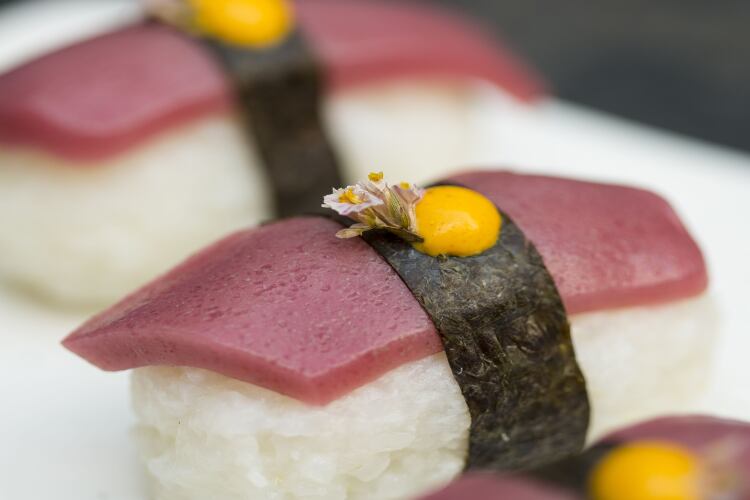Germany-based Kuleana is a food tech start-up with big ambitions. It wants to help solve some of the most pressing problems in the tuna supply chain. This is a broad-ranging set of concerns ranging from under-supply and pollution, to health and food fraud, according to the company’s founder and chief executive Jacek Prus.
There are ‘not enough fish in the sea’ with overfishing and other issues contributing to decreased fish stock levels, he explained. “All bluefin tuna stocks have critical biomass levels, with several species being 2% of [the levels recorded in the] previous century. Southern bluefin tuna have critically endangered status. The majority of tuna fattening farms also rely on these wild stocks, as tuna are incredibly difficult to breed, and perpetuate this issue,” he told FoodNavigator.
But that isn’t the only environmental problem that Prus traces back to the conventional fishing industry. He pointed to the significant contribution fishing makes to ocean plastic pollution (a report from Greenpeace last year found 10% of ocean plastic pollution and 70% of plastic larger than 20cm was linked to fishing).
From a consumer perspective, the food tech innovator also believes that shoppers are concerned over the health implications of eating ‘apex predators’ like tuna. “Consumers have growing health concerns associated with consuming… apex predators such as tuna because of their concentrations of mercury, microplastics and dioxins. When it comes to consuming raw fish, bacteria and parasites are also on people’s minds,” he suggested.
Fish fraud is another problem plaguing the seafood sector. According to recent research from the University of British Colombia, 14 million tonnes of unreported fish catches are traded illicitly each year at a value of between $9bn and $17bn.
“Fraud and crime are prevalent throughout the seafood industry. A retail study by Oceana found one in three fish mislabeled and the IUU coalition found one in five fish to be illegally caught,” Prus added.
“Human slavery issues are rampant in the fishing industry with a study of 35 major tuna companies showing that only 8% of the companies have modern slavery policies that apply to all workers in their supply chains.”
Where should consumers who want to avoid these ethical, environmental and health pitfalls – without sacrificing their sushi hit – look? Prus believes that Kuleana’s high-tech plant-based tuna substitute is the answer.
“Because we’ve focused on developing such a high-fidelity product, we’re convinced that it will help to get tuna off the table. We’ve found that in order to truly replace a product, the substitute has to be at least as good in the fundamentals of taste, cost and convenience.”
The science behind the seafood
Co-founder Sònia Hurtado explained that the R&D process behind Kuleana’s tuna substitute was a long and complex affair.
“We’re creating the next generation of raw tuna powered by plants and biotechnology,” he told us. “We did this through developing and testing hundreds of prototypes, combining different processing technologies, comparing directly with different cuts of raw tuna and partnering with some world leading food science and technology groups.”

The company knew that texture would be the ‘most difficult’ organoleptic trait to mimic – so this was the ‘first focus’.
“We began by exploring multiple avenues from working with partners in extrusion and other texturizing technologies to working on different plant-based formulations. Ultimately, we discovered the power of combining algae and plant proteins using traditional processes in an unconventional way,” Hurtado detailed.
“In another arm of the company we are developing novel biotechnology processes that will be implemented into our products for further texture and flavour enhancement. Here our co-founder and CTO, Ron Shigeta who was the leading scientist at IndieBio and Wild Earth, will lead the work.”
Hurtado said that more information on the biotech business could be shared after patents are filed and intellectual property rights are secured. But on the current tuna product he was able to share some more technical details. “Our current product is made using traditional processing technologies in unconventional ways. We discovered a considerable texture change when we modified several steps in processing.”
On formulation, Hurtado said the aim was to keep the end product ‘as close to the sea as possible’. The company added sea water as well as a select combination of algae, some for flavouring purposes and others for a functional texturizing purpose. “We strive to use organic vegetable ingredients and keep the label as clean as possible.”
Mission accomplished: 'Amazing texture’ and raw tuna flavour

Prus said that the company’s efforts have paid off. Kuleana has produced an ‘amazing texture’ through ‘rheological measurement and proper comparison with the animal product’ as well as consumer test groups that were carried out during the development process.
The tuna analogue also delivers a raw tuna flavour, the entrepreneur continued. “Raw tuna has quite a subtle flavor with hints of fishiness and metallic taste. We’ve combined two natural ingredients derived from koji and algae to deliver this subtle flavor,” he explained.
It also has the appearance of marbling of raw tuna, provided by one of Kuleana’s texturization steps.
Prus was also keen to emphasise the nutritional characteristics of the end product, which he said is ‘high in Omega 3 DHA, potassium, magnesium and one serving of our tuna provides all the daily recommended iron’.
‘We are also competitive on cost’
According to Kuleana’s thesis, for a seafood alternative to catch on it needs to do more than deliver a great taste and texture profile. It also has to compete on cost-effectiveness and convenience.
Prus claimed that Kuleana’s tuna substitute does both.
“While we’re great in taste, and will only be improving as our technology advances, we are also very competitive on cost because of the first principle that plants are incredibly more efficient than animals… Due to this we can provide the tuna experience at a much more affordable level for consumers.
“We address the convenience factor by providing our products through food service channels which consumers are most accustomed to finding raw seafood: poke and sushi restaurants as well as retail sushi counters. We are currently speaking to distributors across Europe, the United States and Brazil.”
And because the plant-based tuna alternative is supplied frozen, Prus added that it helps reduce food waste through an extended shelf life.
Beyond selling its product through foodservice, Kuleana also plans to license its texturization biotechnology to other plant-based and even cultivated meat companies. “This is really exciting for us because this technology expands and diversifies our business model. It also has the potential of improving products across the new protein landscape -- aligning with our philosophy that a rising tide lifts all boats.”




